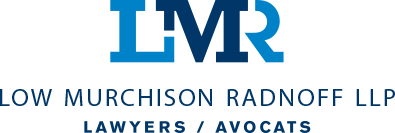Personal Injury Practice Group
Our approach to personal injury law is driven by the core belief that everybody is entitled to fair compensation when it comes to a personal injury, such as a car accident, a slip and fall, or other serious injury or disability claims. It isn’t just about missing out on work, it’s about missing out on life. When somebody else’s negligence negatively impacts you and your loved ones, our Ottawa-based personal injury lawyers will ensure that you receive fair and timely compensation. At Low Murchison Radnoff we have over 70 years of combined experience in Personal Injury law. Our personal injury lawyers have a wealth of trial experience and a proven record of favourable results in serious injury cases. Additionally, we practice personal injury law in both English and French.
We pride ourselves on providing practical advice and giving clients the “straight goods”. Our counsel remain objective, levelheaded, and determined throughout the injury claims and litigation process to ensure that you and your loved ones are fairly compensated for your losses. We are very pragmatic in our strategy and equally aggressive in our approach when dealing with insurance companies to ensure a level playing field. We are not afraid and will go to court if necessary.
We deal with all injury claims, including:
- Car accidents
- Injury claims
- Accident benefit claims arising from motor vehicle accidents
- Slip and falls
- Life insurance and long-term disability claims
- Wrongful death claims
- Product defects
Legal Fees – Personal Injury and Disability Claims
Our initial consultation is free. LMR offers contingency fee agreements for most personal injury matters. If you win or settle your case, we take a percentage of your settlement. If you do not settle or win at a trial, you do not pay legal fees.
LMR has adopted the Law Society of Ontario’s standard contingency agreement on all of our contingency matters as of July 1, 2021. We aim to ensure complete transparency in the legal process and provide clients with the information they need to make informed decisions about their case.
The maximum contingency fee we will charge is 33% and may depend on complexity and risk based on the facts of your case.
For most matters, we will cover all of the expenses on your file until the conclusion of your case. With most cases, we take the expenses and disbursements from a settlement or if you win an award at trial.
Choosing a law firm is an important decision. To learn more about Contingency Fee Agreements, click here for the Law Society of Ontario’s Consumer Guide. This guide was designed to help you make the best choice for your legal matter. It provides questions to ask potential firms before you sign an agreement.








